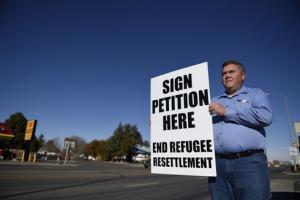RefugeesIgnoring anti-refugee rhetoric, Texans rush to help in resettlement
Texas’ top elected officials have not exactly welcomed refugees over the past year. Last week, for example, Gov. Greg Abbott threatened to end state cooperation with the nation’s refugee resettlement program unless federal officials “unconditionally approve” a Texas plan requiring extra vetting of applicants. But everyday Texans seem to be more willing to help refugees from Syria and elsewhere start new lives in the Lone Star State. Nonprofits that resettle refugees say volunteer turnout has increased — in some cases dramatically — since Abbott first suggested they threatened security.

Some Americans are concerned with allowing Syrians to resettle in the U.S // Source: theconversation.com
Texas’ top elected officials have not exactly welcomed refugees over the past year.
Attorney General Ken Paxton is suing the federal government — thus far unsuccessfully — to keep people fleeing war-ravaged Syria from settling here. Agriculture Commissioner Sid Miller compared refugees to venomous rattlesnakes.
And last week, Gov. Greg Abbott threatened to end state cooperation with the nation’s refugee resettlement program unless federal officials “unconditionally approve” a Texas plan requiring extra vetting of applicants. Such a move would not keep refugees from coming here, but it would eliminate the state government’s role.
But everyday Texans seem to be more willing to help refugees from Syria and elsewhere start new lives in the Lone Star State. Nonprofits that resettle refugees say volunteer turnout has increased — in some cases dramatically — since Texas Republicans first suggested they threatened security.
“It’s one of those rare issues where people’s hearts are really united in supporting refugees,” said Chris Kelley, a spokesman for Refugee Services of Texas, the state’s largest resettlement nonprofit with offices in five different cities. “And I think they see through the rhetoric.”
Kelley said his agency had about 100 names on its Austin volunteer list on 1 November of last year, shortly before state leaders started trying to keep out Syrian refugees. That number has since ballooned to more than 1,400.
The group’s Austin chapter now has 30 “welcome teams,” volunteers who pick up newly arrived refugees from the airport, set up their apartments, help them navigate the town and assist in other ways. That is up from 14 teams in late 2015.
At its other locations — in Amarillo, Dallas, Fort Worth and Houston — the nonprofit says growth in volunteering has ranged from 30 to 50 percent over the same period.
That new interest has hit in waves, Kelley said, including in November, immediately after Abbott announced that “Texas cannot participate in any program that will result in Syrian refugees.”
The growth is not limited to that agency. Officials at Interfaith Ministries for Greater Houston say they are seeing more volunteers each month. The group trained just seven volunteers in July but saw 21 newcomers in September and expects thirty-five more in October. Meanwhile, annual donations for those services have more than doubled over the past year.
